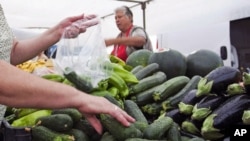A deadly form of E. coli bacteria, reportedly linked to Spanish cucumber exports, has killed at least 14 people in Germany and sickened hundreds more in what experts are saying is the one of the biggest outbreaks of the kind worldwide.
German experts and government officials gathered Monday for a meeting to address the crisis.
Health officials from several European countries including Germany, Austria and Russia pulled Spanish vegetables from sale and blocked additional imports out of concern the outbreak could spread.
Spain lashed out against the ban. Diego Lopez Garrido, Spain's EU representative, said there is no proof that the contamination originated in Spain.
Germany's national disease institute advised people in northern Germany, where most cases have occurred, not to eat raw tomatoes, cucumbers and lettuce.
The European Center for Disease Prevention and Control is investigating the source and scope of the risk. The Stockholm-based group said infected patients developed hemolytic uremic syndrome [HUS], a potentially fatal condition afflicting the kidneys, blood and central nervous system.
According to the European health officials, the outbreak is one of the largest worldwide, and the biggest ever reported in Germany. Most of the outbreak has been in Hamburg, but cases of HUS also have been reported in Sweden, Denmark, the Netherlands and Britain.
Spanish Environment Minister Rosa Aguilar said last week that it is too early to know where the contamination took place. The European disease center, an EU agency, said authorities in Hamburg found E. coli bacteria last week on two samples of Spanish cucumbers, but it was not clear whether they were contaminated at the source or during delivery.
E. Coli Outbreak Kills 14 in Germany




